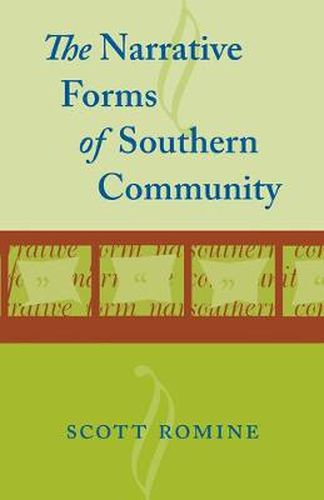The Narrative Forms of Southern Community
Scott Romine

The Narrative Forms of Southern Community
Scott Romine
This title is printed to order. This book may have been self-published. If so, we cannot guarantee the quality of the content. In the main most books will have gone through the editing process however some may not. We therefore suggest that you be aware of this before ordering this book. If in doubt check either the author or publisher’s details as we are unable to accept any returns unless they are faulty. Please contact us if you have any questions.
In this succinct study, Scott Romine considers a key paradox that has been associated with the concept of
community
from the beginning of modern southern literary criticism: namely, that communities often valued for their cohesiveness and moral stability were at the same time sites of oppression along race and class lines. How were communities so deeply divided able to maintain even the appearance of organic cohesiveness? The Narrative Forms of Southern Community contains close readings of five narratives, Augustus Baldwin Longstreet’s Georgia Scenes, John Pendleton Kennedy’s Swallow Barn, Thomas Nelson Page’s In Ole Virginia, William Alexander Percy’s Lanterns on the Levee, and William Faulkner’s Light in August, that attempt to mediate or negotiate the social tensions inherent in the stratified world they represent.
Whereas most earlier examinations of community are thematically oriented, this study focuses on the formal structures, framing techniques, narrative stylistics, master codes, and collective plots, among others, that allow the narrative in question to recover an image of an ideal social order. In particular, this book traces the narrative strategies of deferral, displacement, and evasion that enable what can be thought of as
simulated consensus,
a paradox that informs all of the works under discussion. Romine, in arguing against the idea of community as a group of like-minded individuals, suggests that community is better conceived as a social group that, lacking a commonly held view of reality, connects by means of norms, codes, and manners that produce an artificial, or at least symbolically constituted, social reality.
Romine realises the complexity of the concept of community and appreciates the challenges facing those who wrestle with its questions. By exploring the various ways in which writers associated with the cultural status quo attempt to rationalize the oppressive nature of society, this first book-length study of community in southern literature contributes greatly to current revisionary reappraisals by going beyond many of the old assumptions.
This item is not currently in-stock. It can be ordered online and is expected to ship in 7-14 days
Our stock data is updated periodically, and availability may change throughout the day for in-demand items. Please call the relevant shop for the most current stock information. Prices are subject to change without notice.
Sign in or become a Readings Member to add this title to a wishlist.


